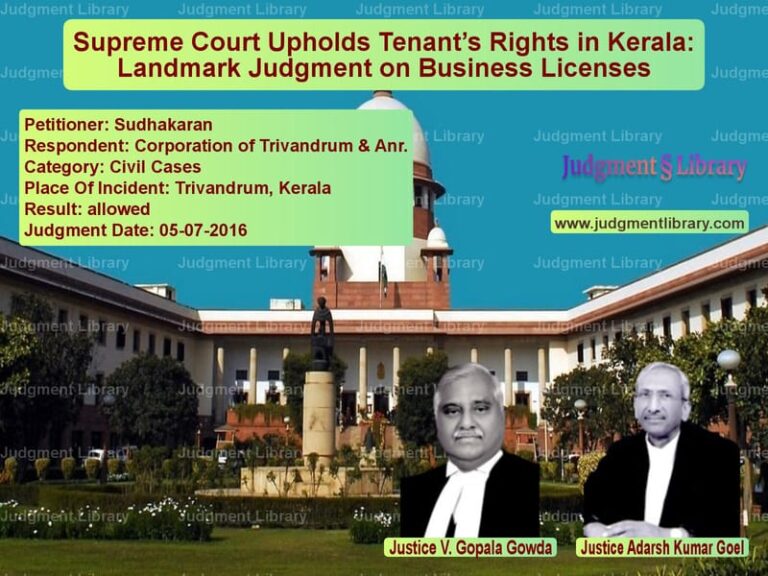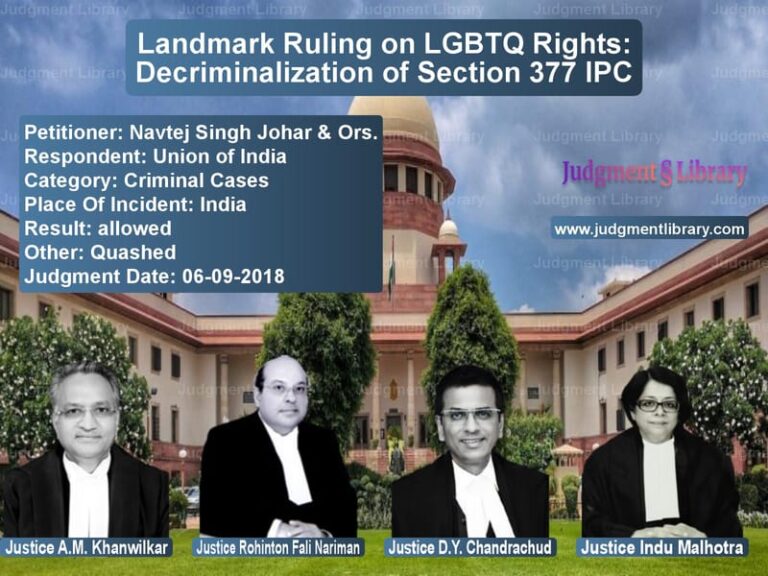Supreme Court Orders Re-Trial in Jabalpur Landlord-Tenant Dispute
The Supreme Court of India, in Bismillah Be (Dead) by L.Rs. vs. Majeed Shah, delivered a significant judgment concerning a long-standing landlord-tenant dispute in Jabalpur, Madhya Pradesh. The case revolved around the legal ownership of a property known as “Moti Bada” (later known as “Allaha Baux Compound”) and the eviction of a tenant who disputed the title of the landlord. The Court set aside the decisions of the High Court, First Appellate Court, and Trial Court and remanded the matter for a fresh trial.
Background of the Case
The original owner of the disputed property was Rai Bahadur Motiram Mathuradas, who had multiple houses in Sadar Bazar, Cantonment Jabalpur. The respondent, Majeed Shah, was inducted as a tenant in House No. 402 by Rai Bahadur Motiram Mathuradas at a monthly rent of Rs. 80.
Due to unpaid income tax liabilities, the Income Tax Department initiated proceedings against Rai Bahadur Motiram Mathuradas. Following his death, his son, Kasturilal Mathuradas, inherited the properties and obtained permission from the Income Tax Department to sell them. Consequently, the property, including the disputed house, was transferred to Vasant Kripalani through a sale certificate issued on June 11, 1974. On the same day, Kripalani sold the property to six individuals, including the appellant, Bismillah Be, via a registered sale deed.
Subsequently, a registered partition deed dated March 14, 1984, divided the property among the six purchasers, and House No. 402 fell to the share of the appellant, Bismillah Be. Following this, the appellant sought to evict the respondent, citing unpaid rent and unauthorized construction.
Arguments by the Appellant
- The appellant contended that the respondent was a tenant under the original owner, and by virtue of successive legal transfers, the appellant had become the lawful owner of the property.
- The appellant claimed that the respondent had not paid rent for three years and had made unauthorized modifications to the property.
- The appellant issued a legal notice demanding arrears of rent and the respondent’s eviction under the M.P. Accommodation Control Act, 1961.
Arguments by the Respondent
- The respondent admitted to having occupied the property for 50 years but denied that the appellant had any legal claim over it.
- He argued that after the death of Rai Bahadur Motiram Mathuradas, the Cantonment Board acquired the property, and he was not liable to pay rent to the appellant.
- The respondent challenged the derivative title of the appellant, asserting that no valid landlord-tenant relationship existed.
Decisions by the Lower Courts
The Trial Court ruled against the appellant, stating that she had failed to establish the landlord-tenant relationship. This decision was upheld by the First Appellate Court and later dismissed in limine by the Madhya Pradesh High Court.
Supreme Court’s Judgment
A two-judge bench of the Supreme Court, comprising Justice A.K. Sikri and Justice Abhay Manohar Sapre, reviewed the evidence and legal principles involved.
The Court ruled:
“The appellant has proved her title over the suit house and thus became a landlady of the suit house. In consequence, the respondent became her tenant by operation of law on the same terms as agreed upon with the original landlord.”
The Court further noted that:
- The respondent admitted to being a tenant under Rai Bahadur Motiram Mathuradas.
- The property was legally transferred to the appellant through successive sale deeds.
- Under Section 116 of the Indian Evidence Act, a tenant is estopped from challenging the landlord’s title during tenancy.
- Even if the tenant disputes the derivative title of a successor landlord, the burden of proof is on the tenant to establish ownership claims, which the respondent failed to do.
The Court also criticized the High Court’s summary dismissal of the second appeal:
“The High Court erred in dismissing the appeal without framing substantial questions of law. The case warranted proper legal examination.”
Reversal of Lower Court Findings
- The Supreme Court reversed the lower court’s finding that no landlord-tenant relationship existed.
- The Court held that the appellant’s derivative title was valid and enforceable.
- The case was remanded to the Trial Court for fresh adjudication on additional grounds of eviction under Section 12 of the M.P. Accommodation Control Act.
Key Takeaways from the Judgment
- Tenant’s Challenge to Landlord’s Title: A tenant cannot challenge the original landlord’s ownership but can dispute a successor landlord’s derivative title. However, the burden of proof lies on the tenant.
- Validity of Property Transfers: Successive legal transfers do not invalidate tenancy agreements, and new landlords acquire rights over existing tenants.
- Judicial Review in Second Appeals: The High Court must properly examine second appeals involving substantial legal questions rather than dismissing them summarily.
Impact of the Judgment
- Stronger Legal Standing for Landlords: The ruling affirms landlords’ rights to evict tenants who refuse to acknowledge valid property transfers.
- Clarity on Derivative Title Challenges: The judgment provides legal clarity on how tenants can dispute ownership claims.
- Guidance for Lower Courts: The ruling emphasizes the importance of properly examining legal issues in second appeals rather than dismissing them at the preliminary stage.
Conclusion
The Supreme Court’s ruling in Bismillah Be (Dead) by L.Rs. vs. Majeed Shah underscores the necessity of recognizing valid property transfers in landlord-tenant disputes. By setting aside the lower court decisions and ordering a re-trial, the Court ensured that the appellant’s eviction claims would be fairly adjudicated under the M.P. Accommodation Control Act.
This judgment serves as an essential precedent in landlord-tenant litigation, reinforcing the legal framework governing property succession and tenant rights.
Don’t miss out on the full details! Download the complete judgment in PDF format below and gain valuable insights instantly!
Download Judgment: Bismillah Be (Dead) vs Majeed Shah Supreme Court of India Judgment Dated 29-11-2016.pdf
Direct Downlaod Judgment: Direct downlaod this Judgment
See all petitions in Property Disputes
See all petitions in Landlord-Tenant Disputes
See all petitions in Specific Performance
See all petitions in Judgment by A.K. Sikri
See all petitions in Judgment by Abhay Manohar Sapre
See all petitions in Remanded
See all petitions in Remanded
See all petitions in supreme court of India judgments November 2016
See all petitions in 2016 judgments
See all posts in Civil Cases Category
See all allowed petitions in Civil Cases Category
See all Dismissed petitions in Civil Cases Category
See all partially allowed petitions in Civil Cases Category







